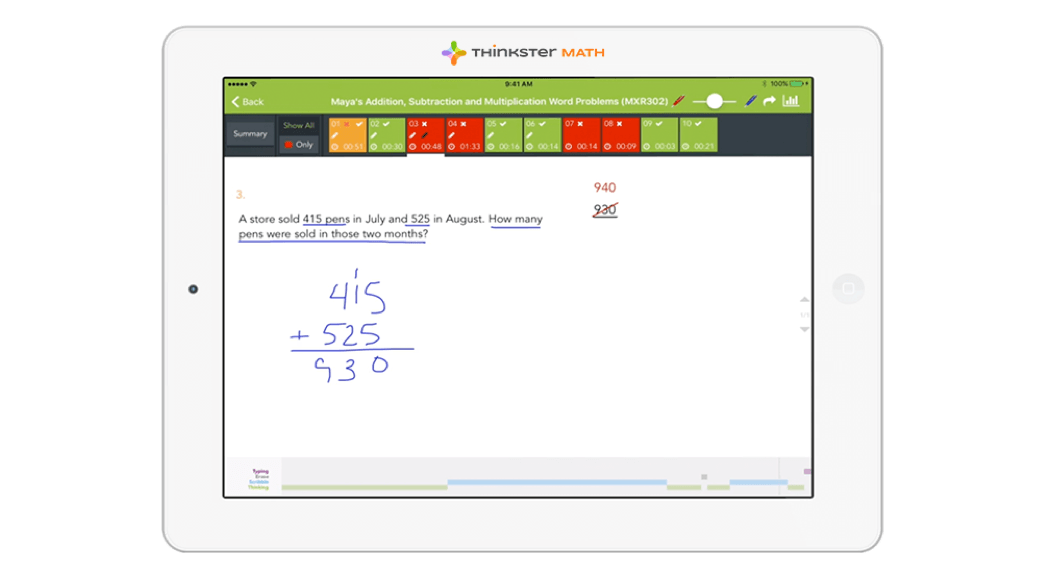

Last Updated on June 3, 2022
If you’re a math teacher looking to make some money outside of classroom teaching, becoming a math tutor is a great opportunity.
As a part-time or full-time position, tutors across the United States make an average of $25,000 a year. This number varies based on location, tutor qualification, experience, and the type of tutoring position or learning center role that you take.
From learning centers to private tutoring to online services, there are many options for teachers who are interested in becoming a math tutor.
Here are 5 exciting types of jobs math tutors have available to them.
One option that you have is to work at a math learning center.
If considering this option, you will need to check the learning style that the center has, followed by the center hours and if those hours fit with your schedule.
You will need to do your research to make sure the learning philosophy and model align with the type of tutoring you are looking to provide.
For example, Kumon methods promote self-learning. This means that you will have very little instruction time or interaction with students.
At high-touch centers, like Mathnasium or Sylvan, you work directly with students and provide small group or one-on-one tutoring and assistance.
With math learning centers, you have set hours during the week in which you see students. At a center like Kumon, you will see the same students once or twice a week. At a high-touch center like Mathnasium or Sylvan, you may work with the same students a few times a week.
Because centers try to provide consistency for the students, your working hours will offer little wiggle room or flexibility. This is so that you can try and help the same students each day. There may also be the need to travel to the nearest learning center, as there may not be one located in your town.
Another option is to become a franchise owner of a math learning center. You will have the ability to train and work with a staff, and it has the potential of being a rewarding experience.

It’s important, though, that you carefully consider the investment required to open a franchise.
Mathnasium shares the investment costs up front, with estimates between $112,000 and $149,000. On top of that are the recurring costs, too, such as the lease for the building, staff payroll, and other bills such as electric, maintenance, and technology fees.
There are also, of course, marketing fees in order to acquire students and maintain high enrollment. If looking into opening a Mathnasium or Kumon franchise, just be sure to carefully consider the costs and potential limitations you may face.
You can also check out more on our blog about why opening a Kumon franchise may not make much sense.
When you hear the words ‘traditional tutoring’, you are likely imagining traveling to a student’s house or a library for private tutoring. There are many teachers who offer private tutoring to students, as they are able to connect with students one-on-one. They help students review challenging concepts they are learning in school or help them with homework.
Aside from the ability to work one-on-one to provide your students with math help, there are also the benefits of setting your own schedule and setting your own fees.

There are two things you will need to carefully consider, though.
One, you may be traveling to different homes, libraries, or community centers – often multiple locations in a day. This can eat up quite a bit of time from your afternoon or evening schedule.
Two, you will need to acquire students on your own and need to determine how you will market yourself. You can create your own ads, flyers, or hope that word-of-mouth travels from the families that you work with to potential new families. Building up your reputation as a successful tutor may take quite a bit of time and some initial investment.
Online and virtual tutoring is growing fast as parents love the convenience and ease of connecting their child with a trained or qualified tutor. In 2016, the online tutoring industry in the United States was worth $132 million and continues to grow 6% each year.
As a math tutor, providing services and math help online is an exciting avenue for you to consider. There is also more flexibility with your schedule, which is nice if you have a family since you can work from home and don’t waste any time traveling to meet your students.
There are different companies available for you to work with that provide online tutoring. Chegg, Wyzant, and Varsity Tutors provide you with the students and a portal to connect with them through.
Just be sure to check out the reviews of companies from current and former employees carefully. Former Chegg employees note that it may be difficult to initially get tutoring appointments, and those that worked with Varsity Tutors say it is very competitive. This can, potentially, hurt your income as you struggle to build up your client base.
Becoming a digital math tutor with a company like Thinkster Math is another exciting opportunity. Digital math tutoring is different than online tutoring, as you are consistently working with students and observing their performance on a daily basis.
As a Thinkster coach, you design and customize a learning plan for each student you work with. Students complete daily, digital assignments from their learning plan that you then send grading and comments on. Once a week you connect with students for one-on-one tutoring time through the application.
When students complete their work, they write on the screen to show their steps and the strategies they are using to solve problems. You will then use the patent-pending Active Replay Technology (ART) to play back the students’ work.
You observe when the student is writing, pausing to think, erasing, or watching a video tutorial. This allows you to understand more about the students learning behavior, such as why they answered incorrectly or used strategies unsuccessfully.

Data from assignments – such as time-taken and accuracy – along with ART and whiteboard tutoring sessions, allows you to efficiently and effectively customize the learning experience for each student and provide incredible learning outcomes.
Thinkster Math coaches love being able to connect with students throughout the country and easily from home!
Thinkster Math coach Yvonne Morris shares, “I really get to know each of my students because we work together for fifteen or thirty minutes every week. The relationships grow exponentially. I had one parent say, “it feels like our tutor is with us every week in the room but she is twelve hours away from us. This program has helped give my child the confidence to know that he can accomplish math.”
And with the ability to make $2000-3000 a month, you’ll be above the average income of what learning centers offer!
As you research different math tutoring jobs, be sure to consider the job factors, such as learning methods, salary, and travel time, that are most important to you.
And remember that you are not limited to only face-to-face instruction. Online/digital tutoring is part of an exploding industry.
If interested in chatting with the Thinkster Math academic team about the exciting opportunities available, send an email to sales@hellothinkster.com. Our team is happy to talk with you in depth about how our tutors provide incredible learning improvements for each and every student.
Between becoming a math tutor, an affiliate, or even a licensee holder, there is infinite potential with our growing Thinkster Math team!
Note: Sylvan Learning® is a registered trademark of Sylvan Learning, LLC. Thinkster Math is in no way affiliated to the same.
Huntington Learning Center®is a registered trademark of Huntington Mark, LLC. Thinkster Math is no way affiliated to the same.
Kumon® is a registered trademark of Kumon North America, Inc. Thinkster Math is in no way affiliated to the same.
Mathnasium® is a registered trademark of Mathnasium LLC. Thinkster Math is in no way affiliated to the same.


